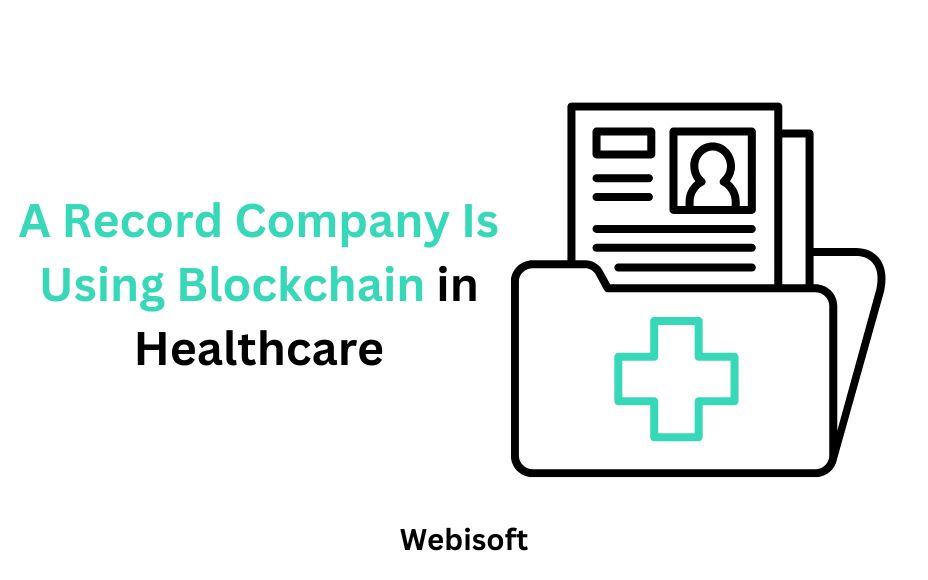The digital world is buzzing with the phrase “a record company is using blockchain”. It’s a concept that’s transforming industries, including healthcare. But what does it mean? Let’s explore.
Blockchain is a digital ledger. It’s decentralized, secure, and transparent. It’s revolutionizing how we manage data, including health records. A record company using blockchain is not just about music. It’s about data management.
In healthcare, patient data is crucial. It’s used for diagnosis, treatment, and research. Traditionally, this data is stored in centralized databases. But these systems have flaws. They’re vulnerable to hacks, data loss, and inconsistencies.
Enter blockchain. It offers a new way to manage health records. It’s decentralized, meaning no single entity controls the data. Each data block is encrypted and linked to the previous one. All transactions are visible to those in the network.
So, how does a record company fit into this? Think of the company as a healthcare provider. They have vast amounts of patient data. By using blockchain, they can securely store and manage this data. They can ensure its integrity and accessibility.
But it’s not just about storage. Blockchain can also improve data sharing. It can enable real-time access to patient records. This can enhance collaboration between healthcare providers. It can lead to more accurate diagnoses and personalized treatments.
Moreover, blockchain gives patients control over their data. This can enhance patient trust and engagement.
A record company using blockchain is a game-changer in healthcare. It’s about leveraging technology to improve patient care. It’s about ensuring data security, integrity, and accessibility. It’s about revolutionizing healthcare. And this is just the beginning.
Contents
How Does a Blockchain-Enabled Patient Or Users Health Record Management Solution Work?
Blockchain technology is revolutionizing healthcare. It’s transforming how we manage patient health records. Let’s delve into this process, broken down into five key stages:
1. Data Generation
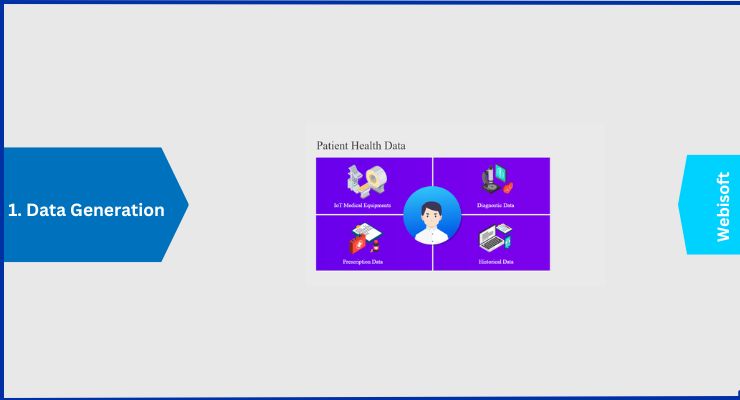
The journey begins with data generation. This is the collection of patient data. It’s sourced from various places. Hospitals, clinics, and wearable devices are all sources.
The data collected is diverse. It includes medical history, diagnoses, treatment plans, and medication information. This process is crucial. It forms the foundation of the health record.
The quality of data collected impacts the entire system. Accurate data leads to accurate diagnoses and treatments. It’s the first step in creating a comprehensive patient health record.
2. Data Enrichment
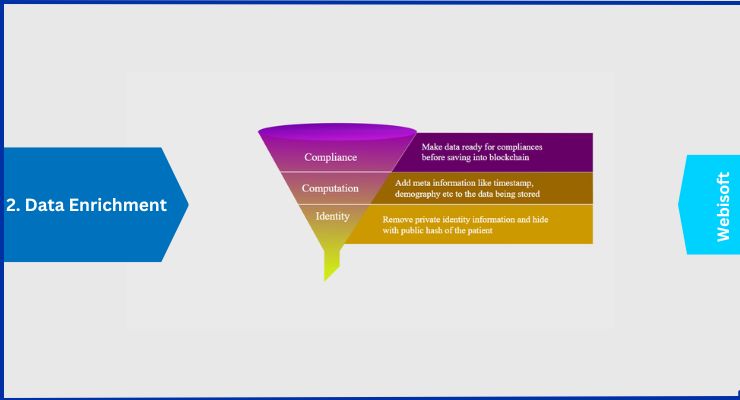
Once data is collected, it’s time for enrichment. This is a process of refining the data. It involves validation, removing inconsistencies, and formatting.
The goal is to make the data usable. It’s about ensuring the data is accurate, consistent, and understandable.
Data enrichment is like polishing a diamond. It takes raw data and turns it into something valuable. It’s a critical step in managing health records. It ensures the data is ready for the next stage: storage.
3. Storing Health Records on the Blockchain
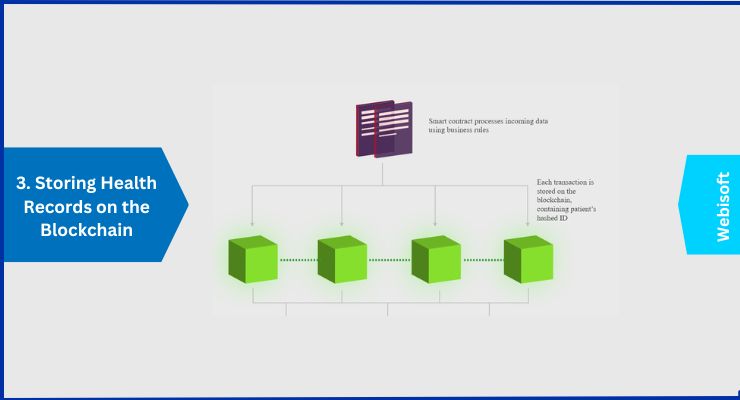
The enriched data is now ready for storage. But not just any storage. It’s stored on the blockchain. This is a decentralized, secure digital ledger. It’s designed to protect the integrity and confidentiality of data.
Each piece of data is stored as a block. Each block is linked to the one before it. This forms a chain of blocks, and thus it names blockchain. It’s a system that ensures data security. It’s a system that ensures data integrity.
4. Data Consumption with Smart Contracts
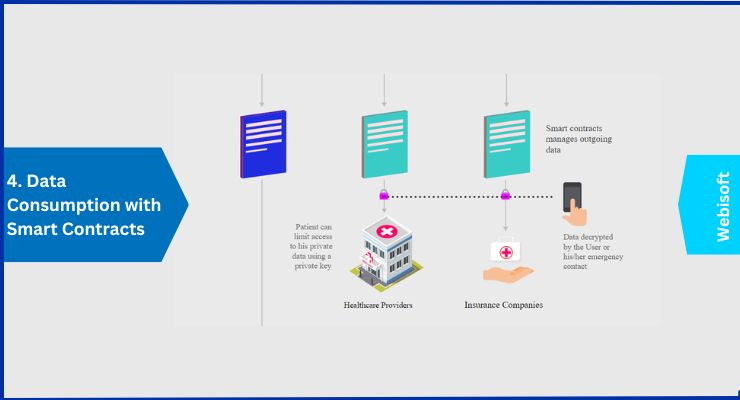
But how is the data accessed? This is where smart contracts come in. They’re self-executing contracts. The terms of the agreement are written into code. They manage access to the data on the blockchain.
Smart contracts are like gatekeepers. They also record any changes to the data. This means all changes can be traced back. It’s a system that ensures data accountability.
5. Data Mining and AI in Blockchain
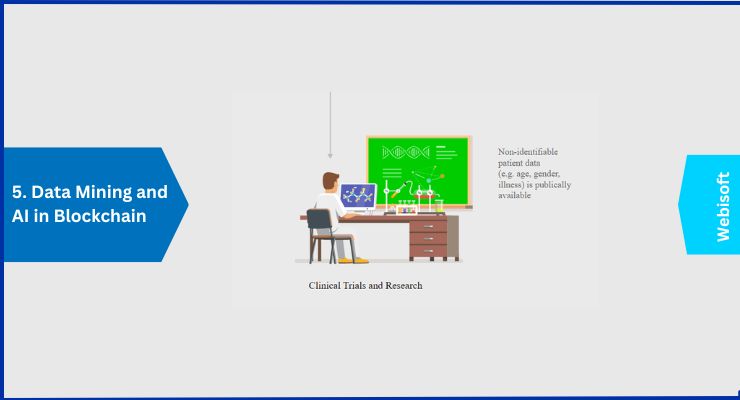
The final stage involves data mining and AI. They analyze the data stored on the blockchain. They identify patterns and trends. These insights are valuable.
Data mining and AI are like detectives. They sift through the data, looking for clues. They uncover insights that can lead to breakthroughs in patient care. They’re the final piece in the blockchain-enabled health record management solution.
In conclusion, a blockchain-enabled patient health record management solution is a game-changer. It’s a system that ensures data accuracy, security, accountability, and usability. It’s a system that has the potential to revolutionize healthcare. And this is just the beginning.
What Are the Benefits of Blockchain in Healthcare?
Blockchain technology is a game-changer in healthcare. It offers numerous benefits. Let’s delve into these:
1. A Simplified Approach to Data
Blockchain simplifies data management. It provides a single, secure, and immutable source of truth. This is a significant benefit in healthcare. Here’s why:
Healthcare deals with vast amounts of patient data. This data is often stored in multiple databases. This can lead to inconsistencies and errors. It can also make data management complex and time-consuming.
Blockchain eliminates these issues. It provides media supply chain blockchain capabilities for storing patient data. This platform is secure and immutable. This means the data cannot be changed once it’s added. This ensures the integrity of the data.
This simplification of data management has far-reaching benefits. It can improve the accuracy of diagnoses and treatments. It can also enhance patient trust. After all, patients want to know their data is accurate and secure.
2. System Interoperability
Another benefit of blockchain is system interoperability. This is the ability of different healthcare systems to communicate and share data. It’s a crucial aspect of modern healthcare.
Healthcare providers often use different systems. This can make data sharing challenging. It can also lead to fragmented patient care. After all, healthcare providers need access to the same patient information to provide coordinated care.
Blockchain solves this problem. It allows different systems to communicate seamlessly. However, this ensures all healthcare providers have access to the same, up-to-date patient information.
This can improve the coordination of care. It can also enhance patient outcomes.
3. Efficiency
Blockchain also increases efficiency. It does this by automating data management processes. It also eliminates the need for intermediaries.
In traditional healthcare systems, data management is often manual. It can also involve intermediaries. These are third parties that manage data exchange between healthcare providers.
Blockchain automates these processes. It also eliminates the need for intermediaries. This can save time and reduce costs. It can also enhance data security. After all, the fewer parties involved in data exchange, the lower the risk of data breaches.
4. Control Over the Data
Finally, blockchain gives patients more control over the user’s data.
In traditional healthcare systems, patients often have little control over their data. This can lead to privacy concerns. It can also lead to patient disengagement. After all, patients want to know their data is being used responsibly.
Blockchain changes this. It gives patients control over their data. This can enhance their privacy and security. It can also increase their engagement in their care. After all, engaged patients are more likely to follow their treatment plans and achieve better outcomes.
In conclusion, blockchain offers numerous benefits in healthcare. It simplifies data management, enables system interoperability, increases efficiency, and gives patients control over their data. It’s a technology that has the potential to revolutionize healthcare. And this is just the beginning.
Use Cases of Blockchain in Healthcare
Blockchain technology is making waves in healthcare. It’s being used in various ways. Let’s explore these use cases:
1. Patient Data Management
One of the primary uses of blockchain in healthcare is patient data management. Here’s how it works:
Healthcare providers deal with vast amounts of patient data. This data is crucial for patient care. It’s used for diagnoses, treatments, and research. But managing this data can be challenging. It needs to be stored securely. It also needs to be easily accessible.
Blockchain provides a solution. It’s a decentralized system. This means the data isn’t stored in a single location. Instead, it’s stored across a network of computers. This enhances data security.
But blockchain isn’t just about storage. It also improves data sharing. This can enhance patient care. It can lead to more accurate diagnoses and personalized treatments.
2. Overcoming Counterfeit Drugs
Another use case of blockchain in healthcare is combating counterfeit drugs. Here’s how:
Counterfeit drugs are a major problem in healthcare. They can lead to serious health risks. But tracking the authenticity of drugs can be challenging. Traditional supply chains are often opaque. This makes it easy for counterfeit drugs to enter the market.
Blockchain can help. It provides a transparent and traceable supply chain. Each transaction is recorded on the blockchain. This includes the manufacturing, distribution, and sale of drugs. This means each drug can be traced back to its source. This can ensure the authenticity of drugs. It can also protect patient safety.
3. Accessibility of EHRs
Blockchain can also improve the accessibility of Electronic Health Records (EHRs). Here’s why this is important:
EHRs are digital versions of patient health records. They contain crucial patient information. This includes medical history, diagnoses, and treatments. But accessing these records can be challenging. They’re often stored in different systems.
Blockchain solves this problem. It allows EHRs to be stored in a single, secure platform. This platform can be accessed anytime, anywhere. This means patients and healthcare providers can access up-to-date and accurate patient information when needed. This can enhance patient care and outcomes.
4. Medical Staff Credential Verification
Finally, blockchain can be used to verify the credentials of medical staff. Here’s how:
In healthcare, trust is crucial. Patients need to know they’re being cared for by qualified individuals. But verifying the credentials of medical staff can be challenging. Traditional methods are often time-consuming and prone to errors.
Blockchain provides a solution. It allows the credentials of medical staff to be stored on the blockchain. This means they can be easily verified. This can ensure that only qualified individuals are providing care. It can also enhance patient safety and trust.
Blockchain has numerous use cases in healthcare. It’s improving patient data management, combating counterfeit drugs, enhancing the accessibility of EHRs, and verifying the credentials of medical staff. It’s a technology that’s revolutionizing healthcare. And this is just the beginning.
What Are the Real-World Examples of Blockchain in Healthcare?
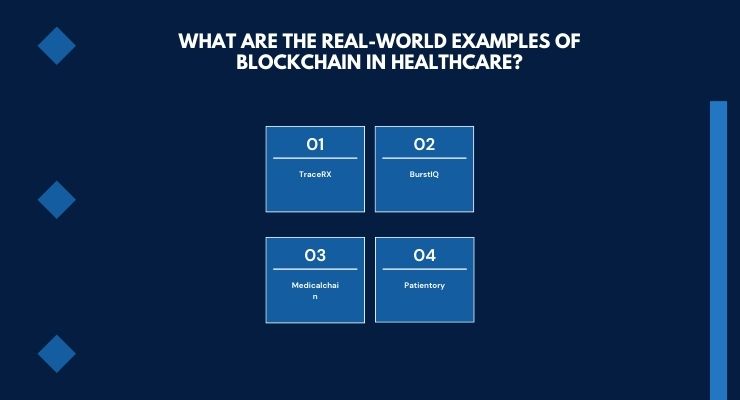
Blockchain technology is not just a concept. It’s being used in the real world. Several companies are leveraging it in healthcare. Let’s explore these examples:
1. TraceRX
TraceRX is a pioneer in using blockchain in healthcare. They’re using it to track and trace the distribution of donated drugs. Here’s how it works:
Donated drugs play a crucial role in healthcare. They provide medication to those who can’t afford it. But the distribution of these drugs can be challenging. They can be stolen. They can also fail to reach the intended recipients.
TraceRX uses blockchain to solve these problems. It tracks and traces the distribution of donated drugs. Each transaction is recorded on the blockchain. This includes the donation, distribution, and receipt of drugs.
This system can prevent theft. It can ensure that the drugs reach the intended recipients. It’s a system that enhances the efficiency and transparency of drug donation. It’s a system that can save lives.
2. BurstIQ
BurstIQ is another company leveraging the blockchain in healthcare. They’re using it to create a secure and interoperable health data platform. Here’s how:
Health data is crucial. It’s used for diagnoses, treatments, and research. But managing this data can be challenging. It needs to be secure. It also needs to be easily accessible.
BurstIQ uses blockchain to solve these problems. It creates a secure platform for health data. This platform is interoperable. This means it can communicate with other systems. This allows individuals and businesses to access, share, and gain insights from health data.
This system can enhance patient care. It can lead to more accurate diagnoses and personalized treatments. It can also enhance research. After all, research relies on access to accurate and comprehensive health data.
3. Medicalchain
Medicalchain is uniquely using blockchain. They’re using it to create a decentralized electronic health records (EHRs) platform. Here’s why this is important:
EHRs are digital versions of patient health records. They contain crucial patient information. But accessing these records can be challenging. They’re often stored in different systems.
Medicalchain uses blockchain to solve this problem. It creates a decentralized platform for EHRs. This platform can be accessed anytime, anywhere. This means patients and healthcare providers can access up-to-date and accurate patient information when needed.
But it’s not just about access. Medicalchain also gives patients control over their EHRs. They can decide who can access their records and for what purpose. This can enhance patient privacy and engagement.
4. Patientory
Finally, Patientory is using blockchain to secure patient data and facilitate data exchange. Here’s how:
Patient data is crucial. It’s used for patient care. But it needs to be secure. It also needs to be easily shared between healthcare providers.
Patientory uses blockchain to solve these problems. It secures patient data. It also facilitates data exchange between healthcare providers. This can improve care coordination. It can also enhance patient outcomes.
Blockchain is being used in the real world. Companies like TraceRX, BurstIQ, Medicalchain, and Patientory leverage it in healthcare. They’re using it to enhance drug distribution, manage health data, improve access to EHRs, and secure patient data.
It’s a technology that’s revolutionizing healthcare. And this is just the beginning.
Webisoft Blockchain Development Service
Webisoft is a leading provider of blockchain development services. Our experienced blockchain developers team can help you leverage the power of blockchain in healthcare.
Whether you need a blockchain-enabled patient health record management solution or a blockchain-based supply chain solution, we have you covered.
Conclusion
In conclusion, “a record company is using blockchain” is more than a buzzword. It represents a revolutionary shift in managing patient health records, offering numerous benefits such as improved data management, increased efficiency, and enhanced patient control over their data.
With real-world examples like TraceRX, BurstIQ, Medicalchain, and Patientory, the future of blockchain in healthcare looks promising.
